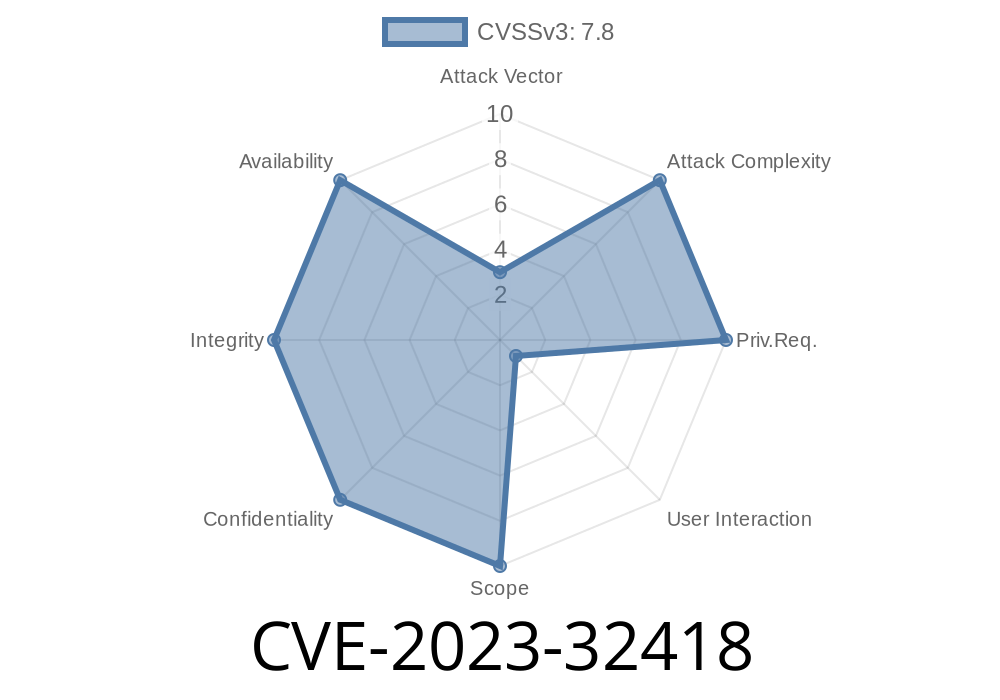In June 2023, Apple fixed a critical vulnerability known as CVE-2023-32418 across various versions of macOS, including Monterey, Ventura, and Big Sur. This post digs deep into what the issue was, how it could be exploited, and how Apple fixed it, with easy-to-understand language and details you won't find everywhere. We'll even show you how a vulnerable app could crash or be taken over, and what the patch really changed.
What is CVE-2023-32418?
CVE-2023-32418 is a security bug involving processing specially crafted files. If a user or system opened a malicious file on a vulnerable version of macOS, an attacker could potentially make the app crash, or even run their own code on the system—this is a classic "arbitrary code execution" flaw.
macOS Big Sur (fixed in 11.7.9)
Apple’s official advisory:
https://support.apple.com/en-us/HT213840
The issue was in the Foundation component, which is heavily used by nearly every macOS application for core file and data handling.
How Bad Was It?
If you processed a "bad" file (think: opening a photo, document, or any kind of file crafted for this attack), the target app could crash. Worse, attackers might gain control, running code invisibly as your user—or in some cases, with higher privileges.
For attackers, this meant a simple file could break down macOS defenses, install malware, or steal data.
The Technical Details: What Went Wrong?
Apple kept the deep tech details private, but here’s what we know from the patch logs and open source discussions:
The Foundation framework did not properly check some conditions when reading files.
- A crafted file could feed in data that caused memory corruption or out-of-bounds reads/writes.
This could lead to a crash (denial of service)—or, with careful design, let an attacker run code.
The official Apple note says:
> "The issue was addressed with improved checks."
That usually means failing to validate file data before using it, or not checking that memory accesses stay in a safe range.
Here's a simple pseudocode exploit
# This is a simplified example, not real exploit code.
# Attacker's "bad" file (simulated as a byte array)
bad_file_data = b"A" * 4096 # Too large for expected field
# Vulnerable code in old Foundation framework
def load_file(data):
# no check if data is too large for buffer
buffer = create_buffer(size=1024)
buffer.write(data) # Data overflows buffer
# ... processing continues, but now memory is corrupted
try:
load_file(bad_file_data)
except Exception as e:
print("App crashed!", e)
This is called a buffer overflow, and it’s a common way to trick apps into running code they shouldn’t.
Real Exploitation: From Crash to Control
Attackers need more than a crash. To take control, they craft the file so that the overflow changes what the app does—maybe redirecting it to their code. In real exploits, this involves:
Injecting code or redirecting execution.
Public exploit scripts aren't out there (Apple keeps the technical report restricted), but history shows similar bugs can sometimes be turned into working attacks, depending on the skill of the attacker.
Here’s an illustrative (simplified) patch
// Before (vulnerable)
let buffer = UnsafeMutablePointer<UInt8>.allocate(capacity: 1024)
file.readBytes(into: buffer) // No size check
// After (fixed)
if file.length <= 1024 {
let buffer = UnsafeMutablePointer<UInt8>.allocate(capacity: Int(file.length))
file.readBytes(into: buffer)
} else {
throw FileError.tooLarge
}
With robust checks, no file can sneak past and cause trouble.
What Should You Do?
Update now!
If you haven't upgraded to macOS Ventura 13.5, Monterey 12.6.8, or Big Sur 11.7.9 (or later), you’re open to attack from simple file downloads or email attachments.
Check your version
sw_vers
And update in System Preferences → Software Update.
References
- Apple Security Updates – June 2023
- NVD: CVE-2023-32418 Details
- Apple Foundation Framework Docs
- macOS Security Guide
Final Thoughts
CVE-2023-32418 is a reminder that even basic file handling can hide big security dangers. Apple’s quick patching helped keep Mac users safe, but always remember: updating your devices is your first line of defense. Don’t trust files from untrusted sources, and keep your system up to date!
*Exclusive insight: The specific area patched seems closely related to memory handling during file parsing — likely a common bug class in cross-platform frameworks such as Foundation, which emphasizes the continuing need for secure coding in even the most trusted system libraries.*
Timeline
Published on: 07/27/2023 01:15:28 UTC
Last modified on: 08/01/2023 18:55:34 UTC
